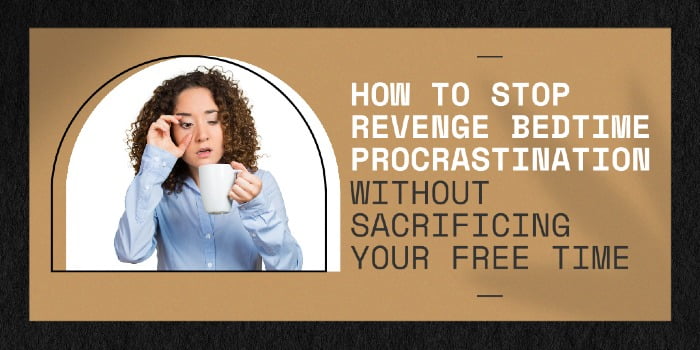Sometimes it feels like there aren’t enough hours in the day.
There’s so much to do, and between work, chores and basic tasks like eating and showering, it can feel like there’s no time left for fun.
If you’ve ever felt like that but decided to stay up late to reclaim lost time to do what you want to do, you’ll have fallen victim to the revenge bedtime procrastination sleep condition.
In this guide, we’ll take you through this condition, its causes and the impact it’s having on your health. And more importantly, we’ll also tell you how to stop revenge bedtime procrastination to sleep better without losing all your free time.
Let’s dive in, shall we?
What is revenge bedtime procrastination?
Okay so first up, what is revenge bedtime procrastination?
Although it has a rather dark and threatening name, revenge bedtime procrastination is the act of denying or putting off sleep in order to spend time doing something you enjoy. This could be anything from reading a book, binge-watching the latest show on Netflix, or even scrolling absentmindedly through social media.
There are two types of revenge bedtime procrastination:
- Bedtime procrastination, which is where you delay the act of getting into, or ready for bed, in order to carry out other tasks. For example, this could be sitting on the sofa playing video games.
- While-in-bed procrastination, which is where you have gone to bed, but delay the physical act of falling asleep by using electronic devices or other distractions in bed.
What you do during your revenge procrastination doesn’t really matter. What’s important is that you are denying yourself the recommended amount of sleep that you need in order to achieve this.
What’s the difference between revenge bedtime procrastination and just staying up late?
Revenge bedtime procrastination isn’t accidental or a one-off event. It’s not ‘accidentally’ staying up late to attend an event, but a regular occurrence knowing that you are tired, and actively choosing not to sleep.
In short, revenge bedtime procrastination can be defined using these three characteristics:
- A delay in going to sleep, reducing the total amount of sleep that you receive, making it under the recommended 8 hours a night.
- Not having a ‘valid reason’ to stay up late, such as a one-off external event or an illness that makes the occasion out of the ordinary.
- An awareness that staying up will lead to negative consequences the following day, but choosing to stay up anyway.
Revenge bedtime procrastination may seem like an active choice to not sleep, but we’ll discuss the psychology behind this behaviour and its causes in a later section.
Where’s the revenge in revenge bedtime procrastination?

Having a sleep condition with the word ‘revenge’ in the name makes it sound like you’re out in the streets like a sleepwalking, villainous batman to right the wrongs you have suffered.
Thankfully, (or sadly?), revenge bedtime procrastination is nothing like that.
The ‘revenge’ in revenge bedtime procrastination comes from the idea that you’re taking revenge for the daytime hours that have robbed you of your free time. So, instead of going to sleep, you ‘steal’ hours back to spend on yourself and the activities that you enjoy.
It would be a great plan, except the reality of the situation is that you’re only taking revenge on, well, yourself.
Interestingly, the term ‘bedtime procrastination’ emerged from a 2014 study in the Netherlands. However, it wasn’t until a tweet from Daphne K. Lee where the term ‘revenge’ was added as a translation of a Chinese term ‘報復性熬夜’. Here, Lee tweeted the translation as “a phenomenon in which people who don’t have much control over their daytime life refuse to sleep early in order to regain some sense of freedom during late night hours.”
Since then, the name of this condition has seen more and more popularity, particularly throughout the stress of the coronavirus pandemic, in which 40% of adults reported having increased trouble sleeping.
What causes revenge bedtime procrastination?
Generally speaking, revenge bedtime procrastination is caused by not having enough free time during the day, leading to the concept that someone has to stay up and ‘steal’ the time back to do something they enjoy.
This can be caused by stressful jobs or managing multiple jobs, schedules and tasks such as running errands, caring for others, raising children, looking after pets and more.
However, a stressful and busy schedule is only part of the picture. People who suffer from revenge bedtime procrastination want to sleep, but end up taking a different action instead. The difference between intent and actual action taken is called the intention-behaviour gap.
Some scientists argue that the intention-behaviour gap is caused by a lack of self-regulation or control, which is naturally at its lowest at the end of the day. Thus, people with poor self-regulation are even more susceptible to different types of procrastination, including revenge bedtime procrastination.
However, others argue that the link between the intention-behaviour gap and self-regulation isn’t enough, and other factors may be influencing this behaviour.
Who is most affected by revenge bedtime procrastination?
Anyone can be affected by revenge bedtime procrastination as it’s prevalent amongst those that are suffering from a lot of stress or particularly busy schedules.
Revenge bedtime procrastination is also common in those who have had a change to their lifestyle, such as those who now work longer hours or have moved to home working since the pandemic.
Although not much research has been conducted on revenge bedtime procrastination, it initially seems to be common amongst students and women.
Why is revenge sleep time procrastination bad for you?

Sleep is incredibly important. In fact, it’s properly one of the most important activities that we do.
Sleep is where your body mentally and physically rests and recovers. It’s how we heal muscles and injuries, keep your immune system strong, process and store memories and much more. Basically, it’s how we keep functioning as a human, which is why roughly one-third of our entire lives will be spent catching those zzz’s.
Without sleep, we suffer. This is why revenge bedtime procrastination can be so bad for you.
Just one night without missing a few hours of sleep will leave you feeling groggy, tired, grumpy and lacking motivation or concentration to make it through the next day. It will also reduce your ability to make decisions, formulate the right emotional responses to situations and makes it difficult to think clearly.
When a lack of sleep becomes a pattern, you pose a serious risk to your health.
This includes greater risks of:
- Heart disease and other cardiovascular conditions;
- Type 2 diabetes;
- Obesity and trouble controlling your metabolism;
- A poor immune system, leaving you at risk for more infections and diseases;
- Hormone-related problems;
- Mental health conditions such as depression and anxiety;
- And much more.
Although revenge bedtime procrastination may seem harmless in the short term, it can have a massive impact on your health and must be stopped as soon as you notice the pattern.
How to stop revenge bedtime procrastination
So here’s the big question, how to stop revenge bedtime procrastination?
Sadly there’s no magic wand or medicine that will fix this problem, but we’ve compiled the best tips and advice to help stop you from staying up and putting your health at risk – while still getting time in for the things you love.
1. Schedule time to rest
Taking a break is incredibly important. When you’ve got a busy schedule, it’s the thing you forget to do the most.
Even at work, you might be tempted to work through your lunch break and try to be ‘on’ all day to hit your targets or make it through your massive to-do list. But you can’t give 110% all the time. Frankly, you can’t even give 50% all the time.
You need to rest. There needs to be a time in your day where you’re at 0%. A time where you just stop trying to finish that next task and focus on something that matters: you.
By scheduling more breaks and rests into your day, you won’t feel so pressured to take time back at night, helping you break out of the revenge bedtime procrastination cycle. When it comes to following this tip, try to schedule me-time into your day the same you would a normal task. Write it in your calendar, put down a post-it note, or set an alarm to remind you to take a step back and relax.
2. Rethink your goals
Trying to achieve too much is a big factor in revenge bedtime procrastination. Having unrealistic goals is also a big cause of stress, which also doesn’t help your nighttime procrastination.
If there’s something you’re trying to achieve, whether it’s in work or your personal life, break the goal down. For example, if you’re decorating your house, don’t make the goal ‘finish the house’. It’s too big and no matter what you achieve, you’ll be blinded by the big finish line that will always be too far away. Instead, break it down into smaller goals like:
- Pick a new livingroom colour;
- Hang up the new paintings in the bedroom;
- Paint the kitchen cupboards;
- Put up the new flat-pack furniture.
This won’t just help remove stress, but also help manage your schedule in a better way, giving you back more free time. What’s more, it also gives you a reason to celebrate when you hit the smaller milestones, rather than just dreading the rest of the journey.
This tip also applies to your goal to stop revenge bedtime procrastination as well. Don’t create an unrealistic expectation that you’ll be sleeping soundlessly in a week. Instead, break down the task into smaller, more achievable goals, like going to bed 10-15 minutes earlier.
3. Do what matters – and drop everything else

Remember that cliche piece of advice to “make time for the things and people that matter the most”?.
Yeah, well it might be cliche, but frankly, it’s important advice to follow in this situation. Revenge bedtime procrastination occurs in people who feel like they have no time in the day to focus on themselves or their own hobbies.
So if you’re suffering from this condition, one of the ways of how to stop revenge bedtime procrastination is to take a harsh look at your own schedule and cut out anything that isn’t important.
4. No nighttime gadgets
Using gadgets such as phones or laptops in bed is a particularly prevalent vice for those who suffer from the while-in-bed procrastination from revenge bedtime procrastination. And hey, you’re not alone in that respect. In fact, one YouGov survey found that 65% of people use their phones in bed.
However, using gadgets at night can make your sleep worse by keeping your mind active and disrupting your circadian rhythm with the light they emit.
So, leave the gadgets alone while you’re in bed.
5. Create a nighttime routine
Having a set bedtime routine can be amazing for stopping revenge bedtime procrastination. This works in several ways:
- It can eliminate the need to stay up and ‘steal’ time for yourself if you naturally dedicate time to winding down before bed.
- It can make the process of getting ready for bed feel automatic, stopping the thought of staying awake crossing your mind.
- It can actually help you fall asleep faster and improve your sleep by getting your body and environment in the best possible position to sleep before bed.
The actual nighttime routine that you create is up to you. This could include reading a book, taking a bath, doing very light exercise like yoga or even drinking a nice cup of chamomile tea.
For best results, you’ll want to do activities that actively slow your body and mind down into a place where you feel tired and ready for bed. Then when you reach this point, enter your cool, distraction-free bedroom to drift off peacefully.
To find out more about improving your sleep with healthy nighttime routines, read our guide on sleep hygiene here.
6. Assess the stress in your life
Revenge night time procrastination is common among those that are suffering from a lot of stress or a busy schedule – making them feel like they have no free time left to enjoy.
If this applies to you, then you might want to spend some time thinking about what stresses you’re currently under and what you can do to ease the strain.
- Is there any commitments that you can drop off your plate?
- Are your stresses temporary, or will they be around for a long time?
- Can you do anything now to solve one of these stresses?
When it comes to assessing stress, you need to consider the little things. Although it might not seem much to agree to a 10-minute task on your schedule if you’re overwhelmed with everything else that can be the straw that breaks the camels back.
So, think about what’s important and cut back until you can breathe again. If you need help dealing with stress, you may also want to consider talking to a therapist to learn techniques to manage and deal with your stresses.
7. Leave work at work

Revenge bedtime procrastination typically happens because you don’t get any time to concentrate on yourself, so you take extra time to do the activities that make you happy. One of the leading causes of this is stress.
Although we’ve mentioned how to deal with stress earlier, sleeping when you have a lot on your mind can be almost impossible. In some cases, although you might want to go to sleep, the thought of other deadlines or stresses will cause you to regress into revenge bedtime procrastination instead.
One tip to help reduce this is to leave work, at work. If you work in an office, or a different room, try to leave your work there. Don’t bring your laptop into bed with you, and don’t answer emails on your phone.
By physically leaving work in a different room from where you sleep, you can help cast these thoughts out of your mind. This in turn will help reduce the stress at night, helping you to fall asleep faster and not be tempted to stay up longer doing a task you enjoy to take your mind off of your other stresses.
8. Take it easy
Revenge bedtime procrastination is not an easy thing to break out of. It’s not something you can turn off with a switch and suddenly be ‘fixed’.
It will take time and you will have ‘relapses. It’s natural.
The worst thing you can do is beat yourself up about your process and add stress to an already stressful routine. Just take it a little bit at a time and celebrate your small achievements as they happen.
By sticking to these tips, you will gradually beat this condition.
Is revenge bedtime procrastination a sign of depression?
Revenge bedtime procrastination doesn’t necessarily mean that you’re suffering from depression but can be considered a factor or sign of mental illness depending on your circumstances.
If you’re feeling stressed or anxious about your life and schedule, and are suffering from revenge bedtime procrastination as a result of this, you may want to consider talking to a medical professional to help.
In addition, a lack of sleep caused by revenge bedtime procrastination can make depression and mental illness symptoms worse. So if you’re struggling, see your doctor for further advice and help.
Get more sleep advice and feel human again
With the above tips and advice, this guide has shown you how to stop revenge bedtime procrastination and get your sleep back on track.
But if you’re suffering from a lack of sleep right now, find out how you can make yourself feel human again and beat sleep deprivation here.
And as always, if there’s any other sleep advice, tips, or recommendations that you need to get your perfect 8 hours, you can find them at Sleep4Beginners.






